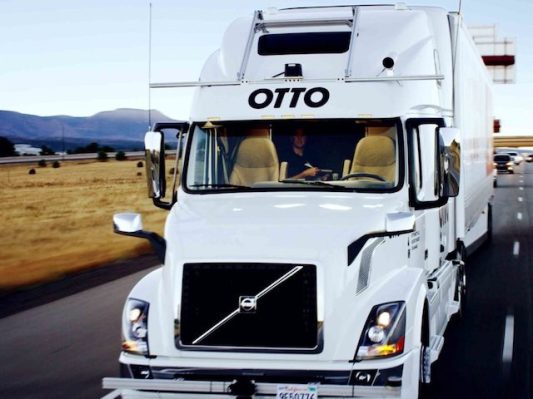Newly-released documents from Google’s October arbitration against Anthony Levandowski, one of the leads of its self-driving car project who abruptly left to launch his own startup Otto in January last year, allege that the talented engineer worked on competing projects for years before leaving Google.
Google also brought arbitration against another Otto co-founder who, like Levandowski, is accused of poaching Google employees in a violation of his employment contract. The documents redact the name of the co-founder, but the work history they describe matches that of Otto co-founder Lior Ron, including his expertise in mapping technology. Ron has not yet returned a request for comment about the arbitration and we will update this story if he does. The arbitration appears to allege that Ron participated in Levandowski’s efforts to recruit Google employees using confidential information about Google’ salaries and compensation.
Google’s employment contracts forbid its employees from recruiting their co-workers immediately after leaving the company. Google, which later spun out its self-driving car unit into its own company, Waymo, is currently suing Uber over claims that it used trade secrets and patented technology in its self-driving cars. Google alleges that Levandowski downloaded thousands of confidential documents just prior to his departure from Google and used them to develop self-driving tech for Uber. Uber argues that Google’s complaints should be settled in its arbitration proceeding with Levandowski rather than in court, although it has agreed to litigate Google’s claims that relate to patents.
Google caught wind of Levandowski’s recruitment efforts as early as summer 2015 and attempted to fire him, the arbitration says, but could not confirm the details and did not move forward with the termination. “Levandowski made concerted and repeated efforts to solicit most, if not all, of his direct reports to leave Google,” the document alleges.
The recruitment happened in meetings on Google’s campus as well as at his home. The home meetings were led by Levandowski and his co-founder, according to the arbitration. The pair encouraged employees from Google’s LiDAR team to quit en masse. Google alleges that Otto was only able to progress so quickly and achieve such a high acquisition price from Uber because it had poached many of Google’s employees.
Levandowski was able to collect more than $120 million in incentive pay from Google, the complaint says, “all while he was breaching his obligations to Google and building a company that would compete with Google.”
The arbitration also claims that Levandowski worked on competing projects long before his departure from Google in January 2016. Google claims he operated two side businesses, Odin Wave and Tyto Lidar.
In July 2013, a supplier who worked with Google contacted the company to report they had received an order from Odin Wave for a custom part that closely resembled a part Google used. Google questioned Levandowski about his connection to Odin Wave, which was registered to an address he owns in Berkeley, but Levandowski denied any connection. Odin later merged with Tyto to create LiDAR modules for self-driving cars.
Tyto was owned by a friend of Levandowski’s, Ognen Stojanovski. In the spring of 2015, Google says it considered acquiring Tyto and visited its headquarters. Levandowski participated in Google’s investigation of Tyto’s technology, Google claims, but never disclosed his relationship to Stojanovski. Google alleges that Levandowski’s startup Otto later acquired Tyto in May 2016.
Google says it is seeking damages related to what is calls breaches of contract by Levandowski.
